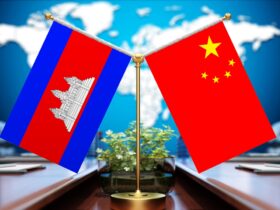Western Protectionism Threatens Global Stability
Western Protectionism Threatens Global Stability
By Mehmet Enes Beşer
Trade was the banner of Western liberalism—a belief in open markets, comparative advantage, and multilateralism. For decades, the United States and the European Union preached the gospel of globalization, negotiating trade agreements, reducing tariffs, and preaching developing economies the virtues of deregulated markets. But in a disquieting turn of historical irony, it is the West—once the great champion of free trade—that is leading the retreat from it.
The recent move by the U.S. and Europe to slap across-the-board tariffs on Chinese-made electric vehicles is merely the latest chapter in this about-face. The move is reflective of a deeper, darker trend: using trade policy as a vehicle for domestic politics to the detriment of global credibility, climate momentum, and economic stability.
This new protectionism of ours is an odd one, characterized by hypocrisy.
Western governments justify such tariffs as a response to alleged state subsidies, intellectual property piracy, and security threats. These, however, have the effect of hiding a distasteful truth: that the West subsidized its own green industries just as much. The U.S. Inflation Reduction Act, a $369 billion green subsidy package, is one of the largest industrial policy interventions in generations. European states also offer gigantic subsidies to local EV producers and battery startups.
The problem is not subsidy per se. The problem is the double standard. When China employs industrial policy to accelerate its green transformation, it is described as coercive and distortive. When Western countries do the same, it is rebranded as “resilience-building.” This rhetorical duplicity erodes the moral high ground once claimed by the West—and imperils the very rules-based order it is attempting to maintain.
Protectionism in trade always comes at a cost, and it is not the politicians implementing it who normally pay. With EV tariffs, it is taxpayers and consumers twice over—once in more costly cars, and then again in slowed progress towards a net-zero future.
Chinese EVs have lowered the cost of e-mobility across the world. By making great cars at mass-market prices, BYD and NIO and others have forced legacy automakers to come up with their own solutions and play catch-up. Blocking their entry into Western markets not only reduces consumer choice, but it also denies the competitive edge to accelerate the switch to green that is required.
Additionally, as the West attempts to ramp up its own production of EVs, supply chains will necessarily be more costly and less efficient. Protectionist measures might gain a temporary reprieve, but they also create complacency—and push the inevitable reckoning with industrial reform further into the future.
The national security invocation has become the catch-all for trade restrictions, particularly in the United States. Commerce Secretary Gina Raimondo’s suggestion that Chinese EVs present data risks is reminiscent of earlier alarmism applied to support bans on Huawei and TikTok. While legitimate concerns about cybersecurity do exist, the evidence that is produced tends to be short of the broad policies it advocates.
If national security is turned into a blanket justification for economic protectionism, the line between legitimate defense and disguised nationalism is dangerously blurred. The outcome is a fragmented world economy where fear trumps cooperation and political cycles, instead of market signals, dictate policy.
Maybe the most concerning impact of Western protectionism is the harm it inflicts on the global trade architecture. For decades, the World Trade Organization (WTO) served as a forum for settling disputes and having predictable rules. But the U.S. has incapacitated the WTO’s appellate body, and Washington and Brussels increasingly circumvent multilateral channels for unilateral action.
This duplicity does not escape the Global South. Previously punished developing nations, sanctioned by the West for the imposition of tariffs or control of capital flows, now have their previous opponents overlooking the same norms they previously exercised. Western credibility’s decline has the potential to further destabilize the world order, pushing nations into regional groups and bilateral deals that are non-transparent and lack an enforceability mechanism.
The reality is, China’s leadership in green technology—particularly EVs, solar panels, and batteries—is not only a threat but also a chance. Instead of opting for walls, the West can invest in bridges.
Joint ventures, technology-sharing agreements, and cooperative standard-setting could yield mutual benefits while safeguarding core interests. Cooperative regulation of data protection, cybersecurity, and environmental standards would be more effective than blanket prohibitions. Such frameworks wouldn’t merely promote economic growth—they would establish trust in a world desperately lacking it.
Protectionism may gain short-term political returns but is a long-run expense. It erodes institutions globally, damages consumers, ruins climate goals, and deepens international distrust.
The world has only a short window to avoid climate catastrophe, stabilize global markets, and build a more inclusive economy. It can do it through leadership—not in tariffs and exclusion, but in openness, fairness, and innovation. The West once led the world by example through trade. It now must decide whether it still wants to—or will fall back behind the same walls it once urged others to dismantle.

















Leave a Reply